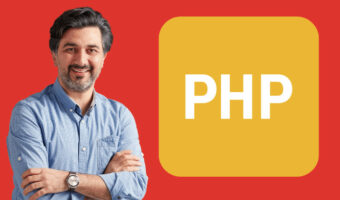Secure PHP Development: Best Practices for Web Security
About This Course
The course “Secure PHP Development: Best Practices for Web Security” offers a comprehensive exploration of best practices and techniques to ensure the security of PHP web applications. In this course, you will learn how to develop PHP applications with a strong focus on security, mitigating common vulnerabilities, and implementing robust security measures.
The course begins by introducing you to the importance of web application security and the potential risks associated with insecure PHP development. You will gain an understanding of common security vulnerabilities and threats that PHP applications may face, such as cross-site scripting (XSS), SQL injection, and cross-site request forgery (CSRF).
Throughout the course, you will learn and apply best practices for secure PHP development. You will explore various security concepts and techniques, including input validation and sanitization, secure session management, and proper handling of user authentication and authorization.
The course covers essential security measures for PHP applications, such as protecting against SQL injection attacks using parameterized queries or prepared statements. You will also learn about output encoding and how to prevent XSS attacks by sanitizing and escaping user-generated content.
Additionally, the course delves into techniques for preventing CSRF attacks, securing file uploads, and safeguarding sensitive data by using encryption and secure storage practices. You will also explore secure coding practices, secure configuration management, and protecting against common attack vectors.
Moreover, the course highlights the importance of regular security testing and vulnerability assessments. You will learn how to perform security audits, identify vulnerabilities, and remediate security issues in PHP applications.
Throughout the course, you will work on practical exercises and hands-on projects that simulate real-world scenarios, allowing you to apply the security concepts and techniques you have learned. By the end of the course, you will have a solid understanding of secure PHP development practices and be equipped with the knowledge and skills to build robust and secure PHP applications that protect against common web security threats.
Learning Objectives
This course is best for:
- PHP Developers: PHP developers who want to enhance their knowledge and skills in web application security and learn best practices for secure PHP development.
- Web Application Developers: Web developers who work with PHP and want to ensure the security of their applications by implementing industry-standard security measures.
- Web Application Security Professionals: Individuals working in the field of web application security who want to specialize in PHP and learn about specific vulnerabilities and countermeasures.
- Software Engineers: Software engineers involved in PHP application development who want to gain expertise in secure coding practices and ensure the security of their software solutions.
- IT Professionals: IT professionals responsible for the security and maintenance of PHP-based web applications who need to understand and implement security measures.
- Freelancers and Web Entrepreneurs: Freelancers and entrepreneurs who develop PHP-based web applications for clients or their own projects and want to ensure the security of their applications to protect sensitive data and user information.
- No matter your level of experience with PHP, if you are interested in building secure PHP applications and want to learn the best practices and techniques for web application security, this course is suitable for you.






